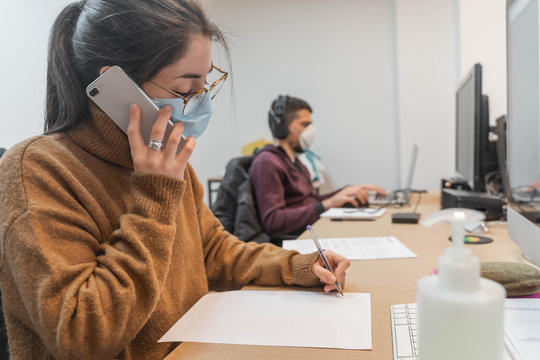Managing Your Food Allergies as a Young Professional
Advocating for your food allergies requires just as much attention in the workplace as it does with family and friends.
Guest post by Daniel Kadden

Daniel Kadden grew up in Great Neck, New York and currently lives in New York City. He attended the University of Michigan where he had his first life-threatening allergic reaction. He has anaphylactic food allergies to sesame seeds, tree nuts, and coconut. He is dedicated to increasing awareness and resources for the food allergy community.
I wanted to shed light to some of the hurdles I have experienced (or been asked about) since I graduated college. The first thing that became clear was how infrequently people spoke about life with food allergies post-graduation. It feels as though people believe if you have made it through college okay, you’ve got it from here. Whereas in reality, just as with any other lifestyle change, the obstacles you face evolve.
I am a 25-year-old in New York City with an active social life and an above-average hobby of trying new restaurants. One friend insists I rate restaurants by how well they handle my food allergies. I have come to realize that the older you get, the more ways there are to deal with food allergies. What works for me may not work for you, but a healthy conversation never hurts.
It may be helpful to give my personal perspective on having food allergies before starting to talk about specific situations. I genuinely believe that I alone am responsible for keeping myself safe, except for uncontrollable situations like an airplane, for example.
Across all settings, everyone has something that they are struggling with and we cannot presume we are top of mind for others. The food allergy community will make progress by having thoughtful conversations that increase awareness of what we have to deal with daily.
With that being said, I want to share an experience I had when I started my first full-time job.
The angst I felt around managing food allergies in a corporate environment was real and worse than I had anticipated. How do I let my coworkers know? What if they do not take it seriously? What if I have an allergic reaction at work? Who would I tell first? Why do I feel embarrassed just thinking about it?
I have asked myself all these questions and more. Let me start by saying this: Most food allergy concerns, rational or irrational, are legitimate. The risk of a life-threatening experience can do amazing things to the imagination.
I feel an immensely misplaced sense of embarrassment around having an allergic reaction in the office. The fact that I know that I would be embarrassed makes me also believe I would be slow to react. Am I about to cause panic in an otherwise orderly corporate environment? Do I use my epinephrine autoinjector in front of everyone? Should I do it now? The answer is yes and immediately, but I know how often I have waited. I have waited to see if this is really happening or what my first move is going to be. If you have not spent any time thinking about what your plan is and how to put it in motion, you are putting yourself in a riskier situation.
As my brother loves to tell me, communication is key. I have spoken with my coworkers and my bosses about my allergies. I have told them where my epinephrine autoinjector is and what to do in an emergency. Then, from among many eager co-workers, I have to pick who gets to inject me with my epinephrine in a worst-case scenario, and it is usually smooth sailing from there.
The “stress” some of us feel about telling coworkers about our allergies is important to talk about. Will I be looked at as a “more burdensome” employee? What if they do not take me seriously? Do I just bring it up? Won’t that be awkward? What if they don’t include me in team dinners? Isn’t it simply better to stay quiet because I am just starting my career? I don’t want to bother them.
I have always taken a very blunt yet casual approach to telling people about my allergies. It is often one of the first things I bring up when asked, “Tell me about yourself.” “My name is Daniel Kadden. I am the youngest of three brothers. I went to the University of Michigan and I actually have anaphylactic allergies to sesame seeds, tree nuts, and coconut.” This almost always prompts the question, “Do you carry an EpiPen?” which leads to a healthy conversation about my allergies.
Ultimately, food allergies are one of the only life threatening medical conditions that is in your control (within reason). You can strategize, plan and take steps to minimize your risk. Within that framework, anything is possible.
Am I still embarrassed to have an allergic reaction in the office? For sure! But the difference for me is, I have had the conversation with friends, family, AND coworkers, so if that day ever does come, I am confident that I will handle it accordingly.


